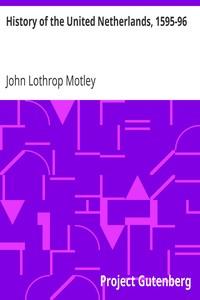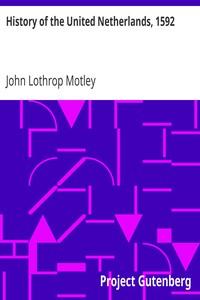|
|
Read this ebook for free! No credit card needed, absolutely nothing to pay.Words: 26735 in 5 pages
This is an ebook sharing website. You can read the uploaded ebooks for free here. No credit cards needed, nothing to pay. If you want to own a digital copy of the ebook, or want to read offline with your favorite ebook-reader, then you can choose to buy and download the ebook.

: History of the United Netherlands 1595-96 by Motley John Lothrop - Netherlands History Eighty Years' War 1568-1648@FreeBooksTue 06 Jun, 2023 Edition: 10 HISTORY OF THE UNITED NETHERLANDS From the Death of William the Silent to the Twelve Year's Truce--1609 History of the United Netherlands, 1595-1596 Archduke Cardinal Albert appointed governor of the Netherlands-- Return of Philip William from captivity--His adherence to the King of Spain--Notice of the Marquis of Varambon, Count Varax, and other new officers--Henry's communications with Queen Elizabeth--Madame de Monceaux--Conversation of Henry with the English ambassador-- Marseilles secured by the Duke of Guise--The fort of Rysbank taken by De Roane Calais in the hands of the Spanish--Assistance from England solicited by Henry--Unhandsome conditions proposed by Elizabeth--Annexation of Calais to the obedient provinces--Pirates of Dunkirk--Uneasiness of the Netherlanders with regard to the designs of Elizabeth--Her protestations of sincerity--Expedition of Dutch and English forces to Spain--Attack on the Spanish war-ships-- Victory of the allies--Flag of the Republic planted on the fortress of Cadiz--Capitulation of the city--Letter of Elizabeth to the Dutch Admirals--State of affairs in France--Proposition of the Duke of Montpensier for the division of the kingdom--Successes of the Cardinal Archduke in Normandy--He proceeds to Flanders--Siege and capture of Hulat--Projected alliance against Spain--Interview of De Sancy with Lord Burghley--Diplomatic conference at Greenwich-- Formation of a league against Spain--Duplicity of the treaty-- Affairs in Germany--Battle between the Emperor and the Grand Turk-- Endeavours of Philip to counteract the influence of the league--His interference in the affairs of Germany--Secret intrigue of Henry with Spain--Philip's second attempt at the conquest of England. Another governor-general arrived in the early days of the year 1596, to take charge of the obedient provinces. It had been rumoured for many months that Philip's choice was at last fixed upon the Archduke Cardinal Albert, Archbishop of Toledo, youngest of the three surviving brothers, of the Emperor Rudolph, as the candidate for many honours. He was to espouse the Infanta, he was to govern the Netherlands, and, as it was supposed, there were wider and wilder schemes for the aggrandizement of this fortunate ecclesiastic brooding in the mind of Philip than yet had seen the light. Meantime the cardinal's first care was to unfrock himself. He had also been obliged to lay down the most lucrative episcopate in Christendom, that of Toledo, the revenues of which amounted to the enormous sum of three hundred thousand dollars a year. Of this annual income, however, he prudently reserved to himself fifty thousand dollars, by contract with his destined successor. The cardinal reached the Netherlands before the end of January. He brought with him three thousand Spanish infantry, and some companies of cavalry, while his personal baggage was transported on three hundred and fifty mules. Of course there was a triumphal procession when, on the 11th February, the new satrap entered the obedient Netherlands, and there was the usual amount of bell-ringing, cannon-firing, trumpet-blowing, with torch-light processions, blazing tar-barrels, and bedizened platforms, where Allegory, in an advanced state of lunacy, performed its wonderful antics. It was scarcely possible for human creatures to bestow more adulation, or to abase themselves more thoroughly, than the honest citizens of Brussels had so recently done in honour of the gentle, gouty Ernest, but they did their best. That mythological conqueror and demigod had sunk into an unhonoured grave, despite the loud hosannaha sung to him on his arrival in Belgica, and the same nobles, pedants, and burghers were now ready and happy to grovel at the feet of Albert. But as it proved as impossible to surpass the glories of the holiday which had been culled out for his brother, so it would be superfluous now to recall the pageant which thus again delighted the capital. But there was one personage who graced this joyous entrance whose presence excited perhaps more interest than did that of the archduke himself. The procession was headed by three grandees riding abreast. There was the Duke of Aumale, pensionary of Philip, and one of the last of the Leaguers, who had just been condemned to death and executed in effigy at Paris, as a traitor to his king and country; there was the Prince of Chimay, now since the recent death of his father at Venice become Duke of Arschot; and between the two rode a gentleman forty-two years of age, whose grave; melancholy features--although wearing a painful expression of habitual restraint and distrust suggested, more than did those of the rest of his family, the physiognomy of William the Silent to all who remembered that illustrious rebel. Could better proof be wanting that in that age religion was the only fatherland, and that a true papist could sustain no injury at the hands of his Most Catholic Majesty. If to be kidnapped in boyhood, to be imprisoned during a whole generation of mankind, to be deprived of vast estates, and to be made orphan by the foulest of assassinations, could not engender resentment against, the royal, perpetrator of these crimes in the bosom of his victim, was it strange that Philip should deem himself, something far, more than man, and should placidly accept the worship rendered to him by inferior beings, as to the holy impersonation of Almighty Wrath? Yet there is no doubt that the prince had a sincere respect for his father, and had bitterly sorrowed at his death. When a Spanish officer, playing chess with him, in prison, had ventured to speak lightly of that father, Philip William had seized him bodily, thrown him from the window, and thus killed him on the spot. And when on his arrival in Brussels it was suggested to him by President Riehardat that it was the king's intention to reinstate him in the possession of his estates, but that a rent-charge of eighteen thousand florins a year was still to be paid from them; to the heirs of Balthazar Gerard, his father's assassin, he flamed into a violent rage, drew his poniard, and would have stabbed the president; had not the bystanders forcibly inteferred. In consequence of this refusal--called magnanimous by contemporary writers--to accept his property under such conditions, the estates were detained from him for a considerable time longer. During the period of his captivity he had been allowed an income of fifteen thousand livres; but after his restoration his household, gentlemen, and servants alone cost him eighty thousand livres annually. It was supposed that the name of Orange-Nassau might now be of service to the king's designs in the Netherlands. Philip William had come by way of Rome, where he had been allowed to kiss the pope's feet and had received many demonstrations of favour, and it was fondly thought that he would now prove an instrument with which king and pontiff might pipe back the rebellious republic to its ancient allegiance. But the Dutchmen and Frisians were deaf. They had tasted liberty too long, they had dealt too many hard blows on the head of regal and sacerdotal despotism, to be deceived by coarse artifices. Especially the king thought that something might be done with Count Hohenlo. That turbulent personage having recently married the full sister of Philip William, and being already at variance with Count Maurice, both for military and political causes, and on account of family and pecuniary disputes, might, it was thought, be purchased by the king, and perhaps a few towns and castles in the united Netherlands might be thrown into the bargain. In that huckstering age, when the loftiest and most valiant nobles of Europe were the most shameless sellers of themselves, the most cynical mendicants for alms and the most infinite absorbers of bribes in exchange for their temporary fealty; when Mayenne, Mercoeur, Guise, Pillars, Egmont, and innumerable other possessors of ancient and illustrious names alternately and even simultaneously drew pensions from both sides in the great European conflict, it was not wonderful that Philip should think that the boisterous Hohenlo might be bought as well as another. The prudent king, however, gave his usual order that nothing was to be paid beforehand, but that the service was to be rendered first; and the price received afterwards. The cardinal applied himself to the task on his first arrival, but was soon obliged to report that he could make but little progress in the negotiation. The king thought, too, that Heraugiere, who had commanded the memorable expedition against Breda, and who was now governor of that stronghold, might be purchased, and he accordingly instructed the cardinal to make use of the Prince of Orange in the negotiations to be made for that purpose. The cardinal, in effect, received an offer from Heraugiere in the course of a few months not only to surrender Breda, without previous recompense, but likewise to place Gertruydenberg, the governor of which city was his relative, in the king's possession. But the cardinal was afraid of a trick, for Heraugiere was known to be as artful as he was brave, and there can be little doubt that the Netherlander was only disposed to lay an ambush for the governor-general. Free books android app tbrJar TBR JAR Read Free books online gutenberg More posts by @FreeBooks
: History of the United Netherlands 1592 by Motley John Lothrop - Netherlands History Eighty Years' War 1568-1648@FreeBooksTue 06 Jun, 2023

: History of the United Netherlands 1590-92 by Motley John Lothrop - Netherlands History Eighty Years' War 1568-1648@FreeBooksTue 06 Jun, 2023
|
Terms of Use Stock Market News! © gutenberg.org.in2025 All Rights reserved.






